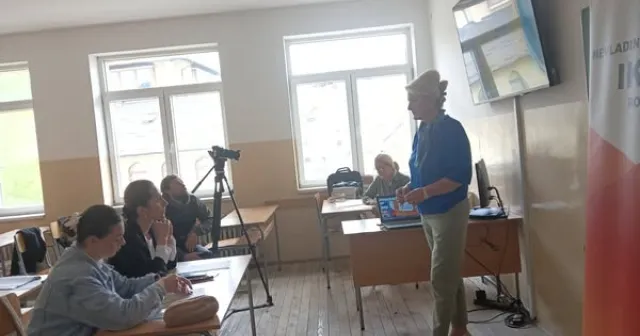Balázs Németh: Learning with a dimension of fun, joy and success

Short bio
I’m Balázs Németh, Associate Professor and Researcher in Adult Education at the Faculty of Humanities and Social Sciences of the University of Pécs. I'm also a member of the Executive Board of the European Association for the Education of Adults and Chairman of the Andragogy Subcommittee of the Hungarian Academy of Sciences. My area of research is the comparative analysis of adult education policy, the issues of professional development and the subject of learning cities and regions.
My story
In my view, a key issue in supporting adult learning is to give serious attention to the development of basic skills as the basis for all efforts and actions to improve adult learning and education. In the European Year of Skills, it is essential to emphasise the need to continuously develop and renew the skills and competences needed for employment, as well as for effective life management and community existence. This can be achieved through education and training policies that pay attention to catching up early school leavers. This leads to developing second-chance schools, while also supporting and integrating non-formal and informal learning initiatives and good practices that can contribute to increasing participation and better results.
In this respect, another important factor is the promotion of cooperation and partnership between formal, non-formal and informal learning spaces, also recognised by adults, which is essential for the successful implementation of a substantial, functioning education and training policy and programme.
Such decentralised solutions can contribute more effectively to the design and implementation of a bottom-up lifelong learning strategy that integrates intergenerational and intercultural factors, based on local needs and opportunities.
It is also important to point out that, for truly effective learning, adult learners must rely on well-prepared teachers and trainers who are educated in andragogy and are able to act as mentors and facilitators. Consequently, the efficient training of adult learning professionals and andragogues is an indispensable prerequisite for the successful education and training of adults in formal, non-formal or informal learning environments. Focusing on this aspect will underpin the renewal of adult education and enable the inclusion of cutting-edge teaching and learning methodologies, as well as counselling, curriculum development, effective measurement and evaluation, organisational/leadership skills, analytical skills and a range of other quality-oriented elements that rely on ICT tools to support in-situ and digital learning for adult learners.
I believe it is important to motivate adult learners and to support collaborative learning based on dialogue, where exploratory and reflective situations are used to transform the learning process into a standard approach for the individual and the community, both in respect of workplace and family/community relations. In this way, learning is given a new dimension of fun, joy and success.
This approach can be reinforced by local collaborations, such as the development of museum learning to meet and shape the needs of adult communities. A similarly promising solution is the organisation of learning communities, cities and regions, which adds an intergenerational component to learning by involving the family and the neighbours, thus revealing the potential and the rich palette of values that communities may bring into the expansion of employment or the touristic, economic and environmental development of settlements. As a result, adult learning can contribute to the development of a sustainable, liveable environment and community, where a prominent role is given to learning about the practices of neighbouring and EU member countries in relation to increasing participation in learning, together with the associated opportunities and constraints.
Finally, I believe that learning and using foreign languages is crucial because it’s a precondition to partnership and competitiveness, to knowing and understanding our neighbours, to becoming aware of the adult learning practices applied in EU Member States, to provide information about Hungarian practices, as well as to share and to exchange experiences with others. For all of this, EPALE provides an ideal platform.
3 Skills for the future of adult learning?

Komentari
Mobility and languages.
I agree with you. Languages are essential for constructive exchanges and mobilities.
Facilitálás
Teljes mértékben egyetértek docens óra, különösen a facilitálás fontosságára helyezni én is a hangsúlyt, kísérni kell a tanulót, főképp akkor hogyha sok-sok kudarc után sokakat mégis a felnőtt tanulók között üdvözölhetjük. Még nyelvtanár koromban tanultam meg leckét: nemcsak nyelvet és kultúrát oktatok, hanem támogatást is adok az élményszerű tanuláshoz, másképp nem működik.





много добра и полезна…
много добра и полезна информация